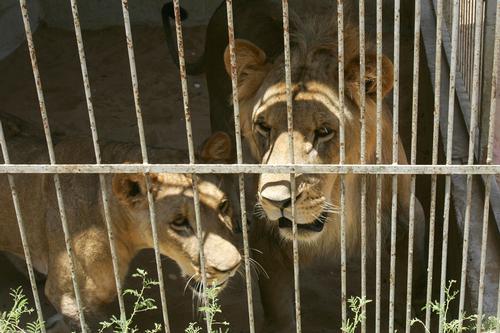see all jobs
Israel-Palestine conflict claims lives of half the animals at Gaza zoo
More than half the animals at a zoo in the Gaza Strip have died either through shelling or thirst during the latest regional conflict, said a keeper at Bissan Zoo, in the northern Gaza town of Beit Lahiya.
Monkeys, ostriches, deer, llama, storks, porcupines and eagles make up the approximate 25 zoo animals to have perished since Israel's military operation in Gaza began on 8 July. They join the 1,975 Palestinians, 64 Israeli soldiers and three Israeli civilians to have died during the conflict, according to the latest United Nations (UN) report.
Wasef Hamad, a 25-year-old who has has worked at the zoo since it was first opened in 2011, said zookeepers have been unable to reach the animals, except during intermittent ceasefires, as airstrikes have made the area unsafe, meaning the remaining animals – including the zoo’s three lions – are close to starvation.
"I came here one time to have a quick glimpse from afar, but I saw death in my eyes… a bomb from an F-16 hit as close as 200 metres [away]," he told Al Jazeera.
"More than half of the animals were killed, most of them by shrapnel, and I think some birds died of thirst."
According to Hamad, most of the animals at Bissan Zoo – which covers around 2.5 acres of a 60-acre park near the border between Israel and Gaza – were smuggled in from Egypt through underground tunnels. With most of the tunnels now destroyed, Hamad says it will be very difficult to bring in new animals, as well as much-needed supplies for those still alive.
"The lions are also sick and need vaccines that are unavailable here, and we can't bring them from Egypt anymore," he added.
The zoo is one of many attraction worldwide currently at risk due to fierce conflicts. Recent reports from Iraq suggest that much of the country’s religious and cultural heritage is at risk from the radical militant group the Islamic State of Iraq and Syria (ISIS), which is destroying heritage sites up to 1,800 years old. Meanwhile in Lebanon, UNESCO is establishing an observatory to monitor and assess Syria’s buildings, artefacts and intangible cultural heritage, to combat illicit trafficking of items of historical significance
from the war-torn region.
More News
- News by sector (all)
- All news
- Fitness
- Personal trainer
- Sport
- Spa
- Swimming
- Hospitality
- Entertainment & Gaming
- Commercial Leisure
- Property
- Architecture
- Design
- Tourism
- Travel
- Attractions
- Theme & Water Parks
- Arts & Culture
- Heritage & Museums
- Parks & Countryside
- Sales & Marketing
- Public Sector
- Training
- People
- Executive
- Apprenticeships
- Suppliers
















































